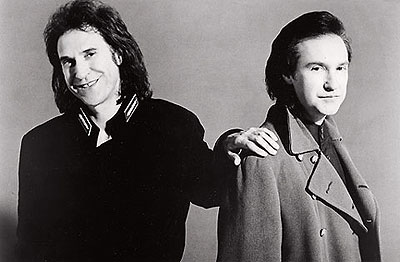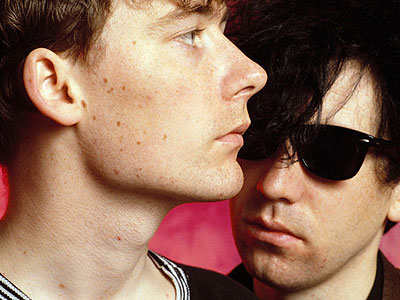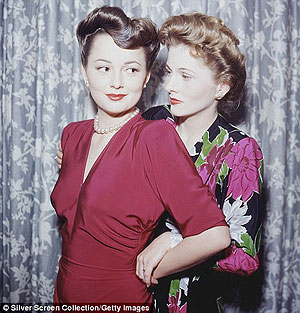I Hate You Like Family: Sibling Rivalry In Pop Culture
Published on January 30th, 2012 in: Issues, Movies, Music, Oh No You Didn't |By Aila Slisco
When the often-quoted W.C. Fields famously said “never work with children or animals,” he might have done well to add “or siblings.” Anyone with a sibling knows that there is an often thin line between love and hate when it comes to relations between brothers and sisters. Sibling rivalry has probably been around as long as siblings have, although it rarely reaches the Biblical proportions of Cain murdering Abel. When it happens in pop culture, even comparatively mild disagreements are amplified and the drama is put on display for all to see.
The early history of anything that might be considered popular music is particularly littered with cases of brothers failing to get along. The Everly Brothers, who had argued with each other over the course of many years, eventually entered a ten-year period of separation after an on-stage incident. Tom Fogerty of Creedence Clearwater Revival ended up leaving the band acrimoniously a few years after John assumed most of the band’s songwriting duties (and the limelight). Although most of the internal struggle for The Beach Boys was centered on cousins Brian Wilson and Mike Love, Wilson also had conflicts with his two brothers before their untimely deaths. There have been many similar groups of brothers with similar problems, probably too many to document in a short article without becoming mind-numbingly tedious, but the most extreme examples are certainly worth noting.

Ray and Dave Davies, The Kinks
Ray Davies of The Kinks allegedly stabbed his brother Dave in the chest with a fork during a dispute over a french fry. This is only one of several anecdotes concerning the volatile relationship of the Davies brothers, and probably the most extreme. Remarkably, they performed together as The Kinks for over 30 years despite their apparently nearly constant hostility. One can’t help but imagine that this would not have been the case had they not been related. On the final Kinks album, Phobia, there was even a tongue-in-cheek song about their relationship called “Hatred: A Duet,” which was incidentally one of the best tracks on the album, aside from being an obvious example of art imitating (and playfully mocking) life. In the years since The Kinks ended their active career, the Davies brothers have continued their public battles, only mellowing slightly after Dave Davies’ stroke in 2005.
Most often siblings will grow apart after many long years of arguments and fighting, but sometimes an ending of communication will be precipitated by a dramatic event. Brothers Jim and William Reid of The Jesus and Mary Chain became increasingly disillusioned with each other over the course their shared career, but somehow kept things afloat for over a decade. In 1998, after a series of disagreements, their hostilities finally came to head at a show in Los Angeles. Guitarist William left the stage in the middle of the show, leaving Jim and his band mates to finish the night and the rest of the tour, and effectively ending the band until their reunion almost a decade later. In more recent times, much as been made of several dramatic incidents borne out of the rivalry between brothers Liam and Noel Gallagher, of the now defunct Beatles quasi-tribute act Oasis.

Jim and William Reid, The Jesus and Mary Chain
Of course, siblings working together does not always result in terrible feuding. There are many examples of siblings who, at least publicly, appear to have great relations with each other. Ann and Nancy Wilson of Heart, Ron and Russell Mael of Sparks, and the Cusack family (most famously John and Joan) come to mind. This lack of drama makes for less than interesting gossip and is therefore rarely made into a spectacle. And it’s probably worth noting that when there are disputes between famous siblings, the signal boost they receive from the media can tend to distort and blow things out of proportion at times, and as a result it’s difficult to be certain of what is or isn’t even true in these matters.
In cases where only one sibling is famous there are other ways in which a rivalry can be sparked. One such example is that of failed director Christopher Ciccone and his slightly more famous sibling Madonna, after Christopher wrote a tell-all book about his sister. Such an obvious betrayal of trust being a problem should have hardly come as a surprise. The root of problems between siblings is very often jealousy, which has the potential to be particularly noxious when one sibling is attempting and failing to break into an entertainment business in which their famous sibling has been wildly successful.
Outside of the world of music, one of the oldest rivalries in Hollywood has been between sisters Olivia de Havilland and Joan Fontaine. Now in their 90s, the pair have not spoken since the mid-1970s, after a lifetime of dramatic disagreements that began in childhood and later included arguments concerning the funeral of their father and mutual snubbing when they received their respective Academy Awards. This is an example of siblings who have never reconciled and are unlikely to ever do so, something which is surprisingly rare in terms of Hollywood (at least publicly).

Olivia de Havilland and Joan Fontaine
A clue to an explanation of the often intense nature of sibling rivalry might be found in the idiom “familiarity breeds contempt.” Every little annoyance between siblings tends to be noted and logged in a manner that is rare amongst friends. Of course, unlike friends, you don’t get to choose your siblings. Most people don’t exactly choose their co-workers either, but when you work with someone unrelated who you despise it’s a bit easier to put them out of your mind when you leave work. Siblings are expected to get along regardless, which can certainly lead to a slow boiling over of hostility. However, the same familiarity that breeds contempt can also breed understanding. These are most often people who grew up together, and who probably have a much better psychological understanding of each other than what might exist with an average friend or a co-worker. And a much greater chance at eventual reconciliation.
Ultimately, we probably shouldn’t even care about the private lives of celebrities. But we live in the age of pop culture, where even the most vacuous happenings of the rich and famous seem to be considered important news events by various tabloids, television shows, and gossip websites. At best, schadenfreude seems to packaged and sold for consumption with considerable regularity. At worst, it almost seems as though celebrities have been elevated to a status comparable to the Greek Gods. And like the Greek Gods, the consumers of pop culture love little more than to see them do battle. Rivalry between siblings is something a huge proportion of the public can relate to, and the most extreme examples probably provide an opportunity for some people to compare and contrast any differences they might have with their own siblings, and most likely come out of it feeling rather fortunate. In the end, sibling rivalry is human nature, and the seemingly scandalous nature of celebrity siblings squabbling isn’t really all that scandalous.
2 Responses to “I Hate You Like Family: Sibling Rivalry In Pop Culture”
January 30th, 2012 at 10:20 pm
[…] the original post here: Popshifter » I Hate You Like Family: Sibling Rivalry In Pop Culture This entry was posted in Uncategorized and tagged a-few-years, even-the-most, limelight, […]
March 4th, 2015 at 6:22 pm
Nikki and Sebastian Sixx, Motley Crue
Time limit is exhausted. Please reload the CAPTCHA.